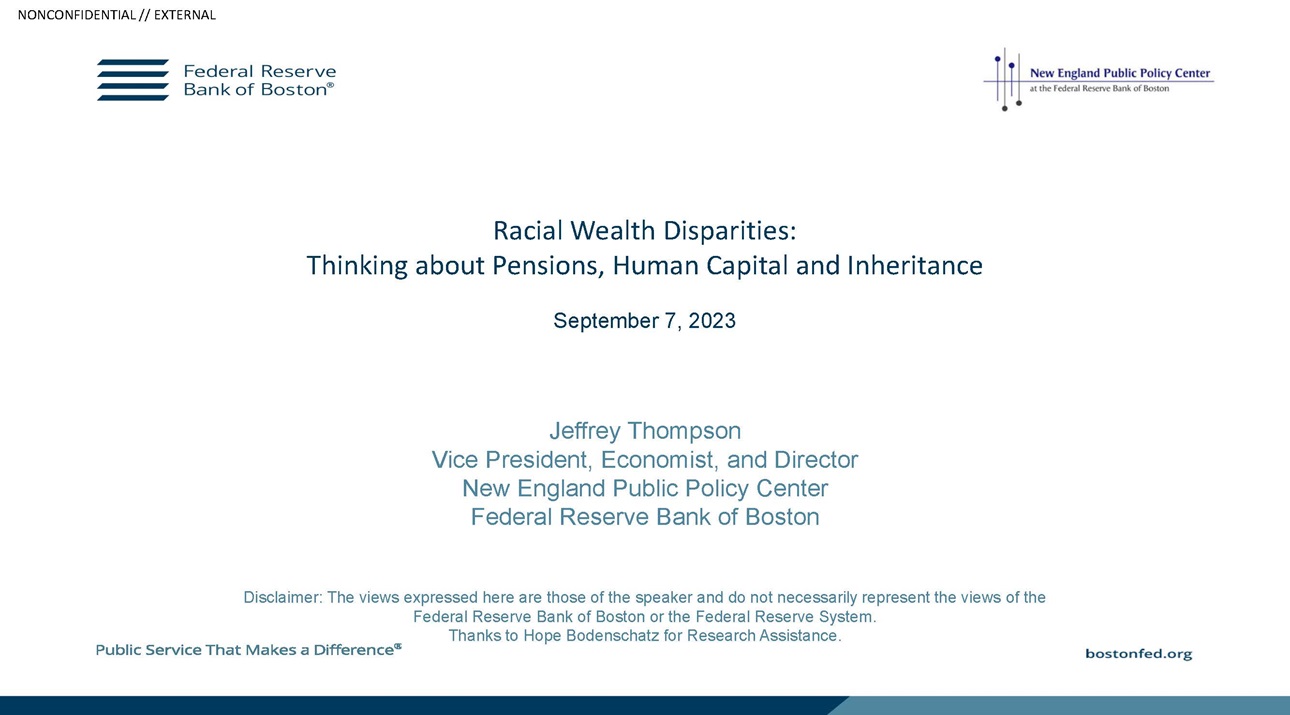Racial Wealth Equity Research and Conversation Series: Education, Retirement, and Inheritances
September 7, 2023
On September 7, Boston Indicators and the Federal Reserve Bank of Boston partnered on the second in their series of conversations on racial wealth equity. The conversation centered around a presentation by Jeffrey P. Thompson, Vice President and Economist at the Boston Fed on “Racial Wealth Disparities: Reconsidering the Roles of Human Capital and Inheritance.”
After an opening welcome from Des Allen, Assistant Vice President, Community Development Outreach at the Boston Fed, Thompson dug into a number of topics around wealth equity over time that illustrated the complex factors feeding the racial wealth gap, and some of the key methods that could be used to reduce and eliminate it over time.
He opened with a discussion of pensions. Long considered a relic of the past, direct benefit pensions are still a part of retirement benefits for roughly 1-in-5 workers, and play a critical role in reducing wealth gaps for many middle-class Black and Latino households. For families in the 50th to 95th percentile of wealth, in particular, direct benefit pension benefits play a large role in wealth, and those benefits bring Black and Latino households much closer to wealth parity with their White peers.
Thompson also looked more closely at two generalizations about the racial wealth gap – the impact of inheritances and the link between education and wealth. While White households are much more likely than non-White ones to benefit from inheritances, 70 percent of white families receive no inheritances, and just 4% of Whites receive inheritances of over $300,000 – meaning that for the vast majority of Americans, inheritance plays no role in wealth accumulation.
When looking at the link between race, education, and wealth, Thompson’s presentation highlighted the multiple dimensions that factor into the racial wealth gap over time, including years in the workforce, number of two-income households, and the aforementioned pension eligibility that when accounted for do narrow but not erase the wealth gap.
In summing up his presentation, Thompson noted that while intergenerational wealth transfer plays some role in wealth gaps over time, that impact pales to gaps in lifetime earnings, pensions and human capital variables that account for as much as 80 to 90 percent of the median wealth gap between White households and Black and Latino ones.
After the presentation, Thompson was joined by Boston Indicators Executive Director Luc Schuster for a Q and A session.
To learn more about Jeffrey Thompson’s work and explore other critical research on racial wealth gaps, visit the Racial Wealth Equity Resource Center, a new project from the Boston Indicators team, at https://rwerc.org.

Agenda
Welcome and Opening Remarks
Des Allen, Assistant Vice President, Community Development Outreach, Federal Reserve Bank of Boston
Racial Wealth Disparities: Reconsidering the Roles of Human Capital and Inheritance
Jeffrey P. Thompson, Vice President and Economist, Federal Reserve Bank of Boston
Q&A
Luc Schuster, Executive Director, Boston Indicators (Respondent/Moderator)
